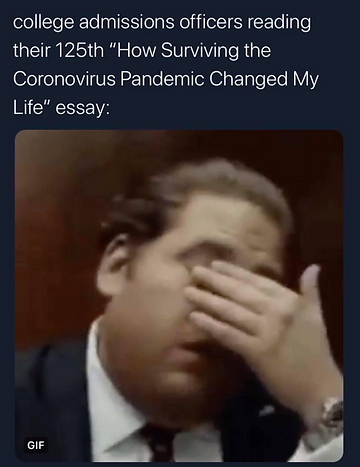Adrianne is a college admissions consultant and TV/film director, producer, writer, and actress currently based in LA. She uses her experience in multiple disciplines to help students achieve their personal and academic goals.

The COVID-19 pandemic has upended normal practices for colleges and universities around the world, and the admissions process is no exception, adding another layer of stress and uncertainty to an already daunting process. Recently, 70% of schools in the U.S. have become test optional, which means other factors are becoming more important in an applicant’s holistic evaluation.
There is also considerably more competition at top-ranked universities. With more free time at home and less requirements to fulfill, more people are finding it easier to apply than before. All Ivy League schools decided to delay admissions decisions by a week due to the influx of applicants, especially during the early action period.
Yet while top schools are receiving an unprecedented amount of interest, colleges and universities outside of the top tier are seeing their numbers drop in huge numbers. Some small colleges have even been shuttered by the financial implications of remote learning. If you’re not aiming for elite colleges (and even if you are), it would be a great time to seriously look into smaller schools where you might get more attention as a potential student.
So, what does a great college application look like in the age of COVID-19?
Academic performance
Your grades will still be the most important factor, since admissions officers will always want to see candidates who have maintained a high level of academic rigor and excellence over the past four years. Many students have also experienced other unexpected academic challenges this year, from a lack of academic tutoring to an inability to focus and perform well in remote learning. Even for students whose grades didn’t slip, some schools switched to a pass/fail mode of grading in the early months of the pandemic, meaning that they won’t receive letter grades or a GPA boost. Whatever the challenge may be, you have room to explain it in the Additional Information section of your application, specifically the new question the Common Application has added about the effects of the pandemic on your life.
Standardized tests
Just because standardized tests are optional at some schools does not mean they are completely irrelevant. On the contrary — you should still try to take tests if possible since any high score will help distinguish you from other applicants. A good test score could be the difference between you and another student with a similar profile, especially in a large applicant pool. But if you are unable to do that, know that you’re in good company.
Teacher recommendations
You can also make up for any academic deficits in your application with a strong letter of recommendation from a teacher or mentor. A great commendation from a teacher who can attest to your work ethic will be noticed by admissions officers. If you’re not sure who to ask, think about the classes in which you’ve worked hardest in and been dedicated to improving your mastery of the material, not necessarily the classes in which you had the best grades.
If the lack of in-person contact is making it difficult to build these relationships, use whatever resources are at your disposal. When communicating with your teachers virtually, make sure that you’re as visible as possible — turn your camera on in class, ask for help outside of class time, and let your teacher know if you are struggling. You could even ask your teacher for additional homework to complete on your own time. Your effort will likely pay off, both in the classroom and beyond.
Extracurricular activities
Extracurricular activities carry a significant amount of weight in your application, and imagination and innovation will be rewarded in this realm. This is a tricky topic, since many students don’t have the opportunity to continue their extracurriculars virtually, especially athletes and performers. While there is hope that those activities will return soon, you’re still going to have to adapt and do what you can, whether that be through taking advantage of existing opportunities or making your own. In fact, students who can use their imagination to create impactful projects during the pandemic will be much more likely to stand out in the next application cycle.
Since you’re lessening your focus on standardized test prep, spend that time on other pursuits that interest you. Join a new extracurricular — lots of debate competitions, dance classes, and language clubs have gone online. You could also propose a new club at your school that could be operated virtually. There are also lots of ways to volunteer without in-person contact, whether it be through coordinating grocery deliveries, becoming a penpal, helping out with an online fundraiser, and tutoring younger students. Find opportunities in your area through VolunteerMatch or ask friends and neighbors.
You could also invest more time in yourself. Learn a new skill on your own, like coding, video production, musical instruments, creative writing, or running. There are now countless online courses through sites like Coursera and Skillshare, so take advantage of these opportunities.
Starting your own project
One of the best things you could do right now is to start your own project. Maybe you have an idea for a business or see an issue in your community that isn’t being addressed — this is the perfect time to make those dreams a reality. Here at H&C Education, our college admissions consultants have helped students just like you turn their ideas into fully-fledged passion projects through our Incubator program.
Some of our students have started their own non-profit organizations that have connected with hundreds of people. Others have written op-eds in local newspapers about the problems they see in their community or created their own media platforms for them to discuss issues that are important to them. Wherever your interests may lie, we are available to help you seize the moment and build the skills you need to be a self-starter. Not only will your creativity and positive contributions help you stand out in the college admissions process, you can develop leadership skills that will set you up to succeed in college and beyond.
Essays
Finally, it comes time to write your essay and tell your story. You should always try to avoid essay clichés, but now that most of the world has lived through this turbulent time, it would be prudent to avoid the “My COVID-19 Experience” cliché as well. To quote Jeff Schiffman, director of undergraduate admissions at Tulane University:
“Everyone is going through something, so I don’t think [admissions] folks are going to want to relive it over and over and over again with 45,000 applications.”

Unless you have a truly unique and refreshing angle, talking about social isolation, cancellation of important events, staring at screens all day long, and “the new normal” is old hat at this point. If you must, just tell your story within the context of COVID — the pandemic itself isn’t your story, after all. Or, better yet, avoid the subject altogether.
The college admissions process has never been an easy experience for students and their families to navigate, and the pandemic has only made it more challenging. However, if you take heed of these changes and adjust your strategies to fit the current moment, you may find yourself succeeding despite these obstacles.



